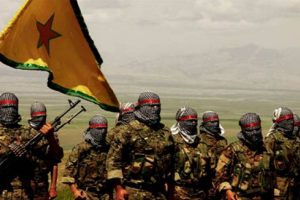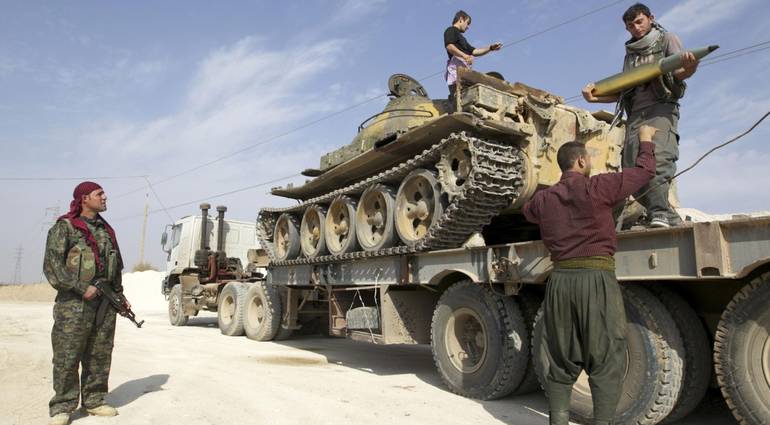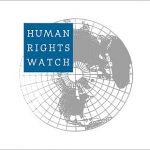ستمروا في إنكار أنهم أخذوه. كيف يمكن ذلك؟ قلت لهم، هل أخذته طائرة من السماء؟ أم أن الأرض انشقت وابتلعته؟
10 / أيلول / سبتمبر / 2018

قالت “هيومن رايتس ووتش” اليوم إن حكومة الأمر الواقع في شمال شرق سوريا تحتجز أعضاء تحالف سياسي منافس، وتنتهك حقوقهم في إجراءات التقاضي السليمة. يبدو أن “الإدارة الذاتية” التي يقودها “حزب الاتحاد الديمقراطي” اعتقلت أعضاء “المجلس الوطني الكردي” تعسفا، وفي بعض الحالات يبدو أنها أخفتهم قسرا.
تحدثت هيومن رايتس ووتش مع معتقلَين سابقَين، وأقارب 2 آخرين لا يزال أحدهما مخفيا، شخصيا في محافظة الحسكة وبالهاتف. قال جميعهم إن المحتجزين حُرموا من الاتصال بأسرهم ومحاميهم. لم يمثل بعضهم أمام قاض، وكان آخرون محتجزين لفترات طويلة قبل تقديمهم إلى المحكمة. قال من قوبلوا إنهم يعتقدون أن سبب الاعتقالات الانتماء أو الرأي السياسي للأفراد.
قالت لما فقيه، نائبة المديرة التنفيذية لقسم الشرق الأوسط في هيومن رايتس ووتش: “يبدو أن الإدارة الذاتية تجمع خصومها السياسيين وتلقي بهم في السجن. حرمان المعتقلين من الإجراءات القانونية الأساسية مؤشر على الاستبداد؛ من يفعل ذلك لا يحترم الحقوق، بعكس ادعاء الإدارة الذاتية”.

سيطر حزب الاتحاد الديمقراطي، المعروف بـ “بي يه دي”، على أجزاء من شمال شرق سوريا أواخر عام 2012، وأنشأ لاحقا إدارة “ذاتية” تمارس الآن السيطرة الفعلية على المنطقة. منذ يناير/كانون الثاني 2018، اعتقلت الشرطة المحلية، المعروفة بـ “آسايش”، والقوات العسكرية المعروفة بـ “وحدات حماية الشعب”، 20 عضوا على الأقل من أحزاب سياسية معارضة وفقا لمنظمات حقوق الإنسان المحلية والإعلام المحلي. لا يزال 10 من المعتقلين محتجزين، أو أماكن وجودهم غير معروفة، بينما أُطلق سراح الآخرين.
في 3 حالات حققت هيومن رايتس ووتش فيها، لم تخبر الإدارة الذاتية والآسايش الأشخاص الذين يسعون إلى الحصول على معلومات عن أقاربهم المفقودين أين كانوا، ولم تسمح بأي اتصال مع المحتجزين. قال قريب أحد الأشخاص المخفيين قسرا في مارس/آذار 2017، ولا يزال مكانه مجهولا:
ذهبنا إلى الآسايش وآخرين. قمنا بزيارة سجون الآسايش، التي يوجد كثير منها هنا. استمروا في إنكار أنهم أخذوه. كيف يمكن ذلك؟ قلت لهم، هل أخذته طائرة من السماء؟ أم أن الأرض انشقت وابتلعته؟… أجادلهم، ثم أقول، حسنا، لم تأخذوه؟ فلتجدوه إذا.

في حالتين أخريين، لم يتم تأكيده وجودهما في سجن آسايش إلا بعد إطلاق سراحهما. أنكرت الآسايش احتجازهما أو معرفة مكان وجودهما عندما كان أفراد العائلة يبحثون عنهم.
قالت ابنة أحد المعتقلين وعمها ومحاميه إنهما حاولا شخصيا 5 مرات الحصول على معلومات حول مكان وجوده، بما فيه بزيارة سجن الآسايش المركزي في القامشلي، والتواصل مع قسم شكاوى الآسايش، وزيارة مقر الآسايش. قالوا إنهم أيضا أجروا عديدا من المكالمات مع معارف والآسايش. قال أفراد العائلة إن الآسايش إما أنكروا احتجازه أو لم يستجيبوا.
قالت الابنة: “لم نكن نعرف ما إذا كان على قيد الحياة أم ميتا، إذا كان بخير، أو أين هو. أبي يعاني من آلام الظهر، وبقيت أذهب إليهم حاملة حقيبته الطبية، وأتوسل إليهم لأخذها وإعطائها له، لكنهم كانوا يقولون: ليس لدينا، لا نعرف عمّن تتحدثين”.
قال المحتجزان اللذان أُفرج عنهما إنهما لم يُسمح لهما بمقابلة محامين أثناء الاحتجاز وأنهما لم يمثلا أمام القاضي إلا بعد احتجازهما لفترات طويلة. في الحالتين الأخريين، لم يُنقل المعتقلون أبدا إلى قاضٍ أو مدعِ عام، وفقا لأقاربهما.
بموجب القانون الدولي وفي غياب أحكام الطوارئ، على السلطات تقديم المشتبه فيه أمام القاضي خلال 48 ساعة من الاعتقال، لمراجعة شرعية وضرورة استمرار الاحتجاز، وضمان احترام حقوق المعتقل. يجب توجيه الاتهام الفوري لجميع المحتجزين أو إطلاق سراحهم. ينص القانون المحلي على وجوب توجيه السلطات الاتهام إلى المعتقل، وتقديمه للمحكمة خلال 5 أيام من الاعتقال.

على السلطات ضمان وجود أساس قانوني واضح لجميع الاعتقالات، وأن جميع المعتقلين يمكنهم الاتصال بمستشار قانوني، بما فيه أثناء الاستجواب، وأن يتم إخطار العائلات فورا إذا تم احتجاز أحد أفراد أسرهم وتقديم تفاصيل عن أماكن وجوده. ينبغي أن يُحال المحتجزون فورا إلى القاضي للنظر في قانونية احتجازهم، وعلى جميع السلطات أن تمتثل فورا لأي أمر قضائي بالإفراج عنهم.
ينص القانون الدولي لحقوق الإنسان، الذي أدرجته الإدارة الذاتية في دستورها، على حق المحتجز في الوصول إلى محام وإبلاغ أشخاص يختارهم المحتجز باحتجازه. كما يُلزم القانون الدولي السلطات بالاحتفاظ بسجلات دقيقة للاحتجاز ومشاركة تلك المعلومات مع الأشخاص المناسبين لحماية المعتقل بموجب القانون ولإيجاد مساءلة فعلية عن جميع حالات الاحتجاز.

عندما تُبلَّغ السلطات بأن شخصا ما قد يكون أخفي قسرا أو كان في عداد المفقودين، ويُعتقد أن قوات الدولة مسؤولة، فإن السلطات ملزمة بإجراء تحقيق فعال قادر على تحديد مكان الشخص وحالته. يحدث الاخفاء القسري بموجب القانون الدولي عندما يحرم شخص ما من حريته من قبل موظفي الدولة أو وكلائها، ويليه الرفض بالاعتراف بالاعتقال أو الكشف عن مصير الشخص أو مكانه.
ينتهك الاخفاء القسري مجموعة من حقوق الإنسان الأساسية المحمية بموجب القانون الدولي، بما فيها حظر الاعتقال والاحتجاز التعسفيين، والتعذيب وغيره من ضروب المعاملة القاسية أو اللاإنسانية أو المهينة، والإعدام خارج نطاق القضاء. كما تتعارض حالات الإخفاء القسري مع الحق في إجراءات التقاضي السليمة والمحاكمات العادلة. وردت القواعد الدولية المتعلقة بأوضاع السجون في “قواعد الأمم المتحدة النموذجية الدنيا لمعاملة السجناء” (“قواعد مانديلا”). تحمي القاعدة 58 حق السجين في تلقي الزيارات “على فترات منتظمة” من العائلة والأصدقاء.
قالت فقيه: “طالما أن الإدارة الذاتية تعتبر نفسها حكومة الأمر الواقع في شمال شرق سوريا وتنفذ الاعتقالات وإجراءات المحاكم، عليها أن تلتزم بالالتزامات الدولية الأساسية لحقوق الإنسان. غياب الأمان ليس عذرا للتعدي على حقوق المعتقلين”.
.
.

 Eng
Eng